Erectile dysfunction (ED) is a common male sexual issue affecting millions. While medication is often prescribed, food can also play an important role in improving erectile function.
Are there foods to cure erectile dysfunction? No single “cure-all” food exists, but a healthy diet rich in certain nutrients may help improve symptoms.
Certain nutrients found in specific foods can improve erectile dysfunction (ED). These foods enhance blood circulation and relax blood vessels.
Food can be a supportive factor, but severe or persistent ED often requires medical intervention.
This article explores some of the best foods to help with ED. It also explains the connection between erectile dysfunction and diet.
Contents
Can Diet Affect Erectile Dysfunction?
Yes, diet can positively impact sexual health, including erectile function (ED). Studies suggest a strong connection between diet and sexual well-being.
While certain foods may offer benefits for sexual health, they should be considered as part of a broader approach to managing ED.
Dietary and lifestyle changes can be helpful for mild to moderate ED.
Consult with a healthcare provider to discuss appropriate treatment options. While improving your diet can be beneficial, it may not be enough on its own.
What Foods Help You Get Hard? 15 Best Foods For ED
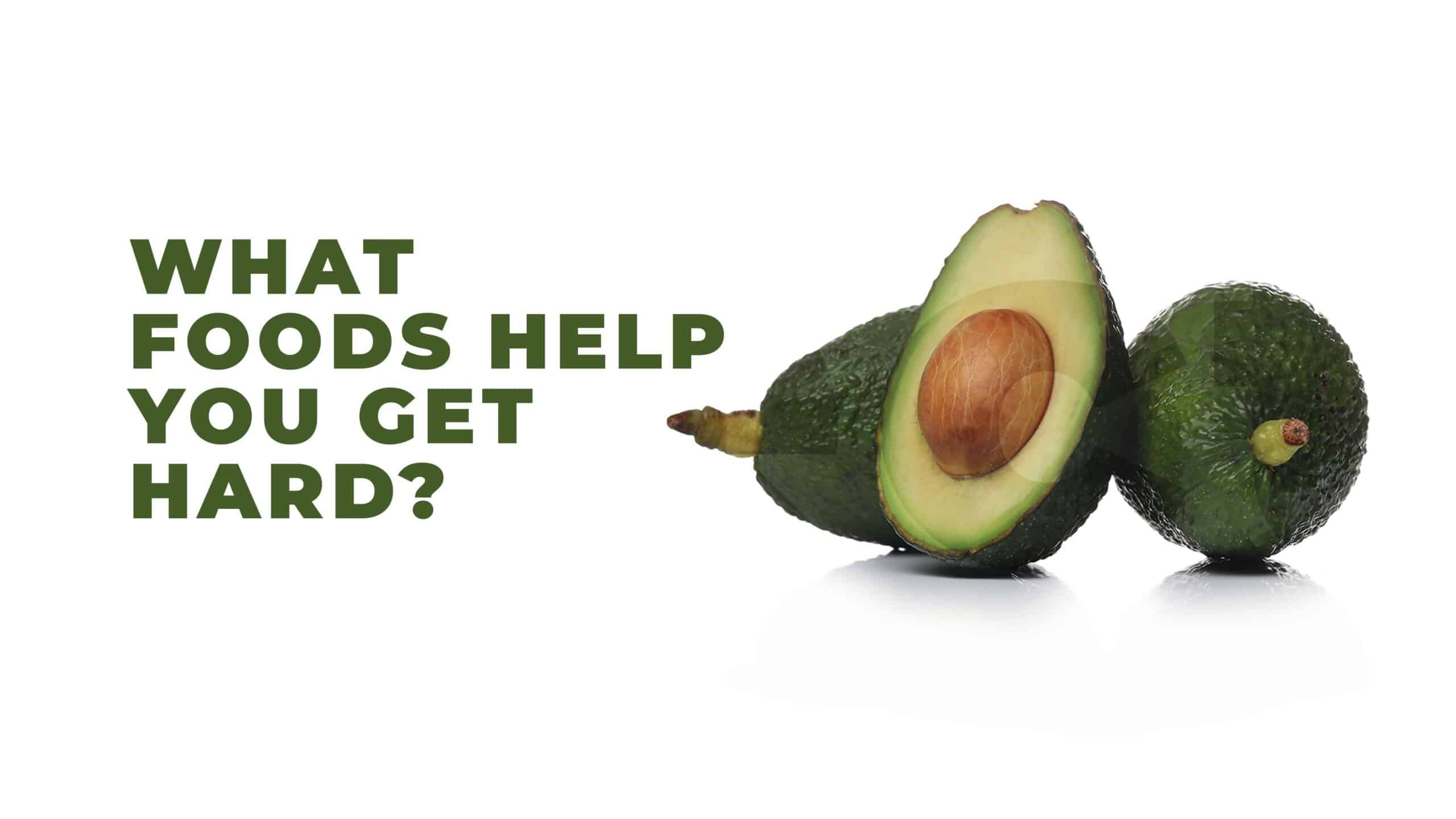
Here are the top 15 foods that help with erectile dysfunction:
1. Oyster
Oysters have long been linked with enhanced libido, and for good reason. They’re packed with zinc, a mineral essential for testosterone production. Testosterone is the key hormone driving male sexual desire and function. Low testosterone can lead to decreased libido and issues like erectile dysfunction.
Zinc supplements can help address deficiencies. But oysters are by far the richest natural source of this vital mineral. Other foods containing zinc include
- Beef
- Blue crab
- Cereals
- Pumpkin seeds
- Pork
- Turkey breast
- Shrimp
2. Berries and other flavonoid-rich fruits
Berries are rich in flavonoids. These are naturally occurring plant chemicals with antioxidant effects. A ten-year study found men with higher flavonoid intake were at a reduced risk of ED. They were 9-11% less likely to develop ED compared to those with lower intake.
Specifically, eating plenty of foods high in flavonoids may lower your risk of ED by up to 19%. These include:
- strawberries,
- blueberries,
- apples,
- pears, and
- citrus fruits
- bananas
3. Watermelon
Watermelon is packed with nutrients that may benefit sexual health. It’s a good source of lycopene. This antioxidant is linked to various health benefits, including improved ED. Research on rats with diabetes showed that lycopene helped with ED. This suggests it could be a promising treatment option.
Beyond lycopene, watermelon contains citrulline, a compound that promotes blood vessel relaxation. This can enhance blood flow, a key factor in erectile function. Recent studies have even shown that combining L-citrulline with ED medications might be helpful for men who don’t respond to standard treatments.
4. Nuts
Nuts may support sexual well-being. Pistachios, in particular, have shown promise in improving erectile function. A small study found that men who consumed pistachios for three weeks experienced significant improvements. This could be linked to the antioxidant content of pistachios, which helps improve blood flow.
Another study suggests a potential link between consuming a mix of almonds and hazelnuts and improved sexual desire and orgasm quality in healthy men.
While these findings are promising, more studies are necessary to confirm the link.
5. Caffeine
Your morning brew might offer more benefits than just a caffeine boost. Some research suggests a possible connection between caffeine and reduced risk of ED.
One study found that men who consumed moderate amounts of caffeine (1-3 cups of coffee daily) were less likely to experience ED compared to those with lower caffeine intake. However, this study relied on self-reported data, which might not be entirely accurate.
6. Dark Chocolate
Dark chocolate is more than a decadent treat. It’s a potential libido booster. It is packed with mood-enhancing phenylethylamine and blood flow-improving flavonoids. As discussed above, a diet rich in flavonoids can reduce the risk of erectile dysfunction.
Enjoying a small amount of dark chocolate daily might contribute to healthy blood flow. This is essential for optimal erectile function.
7. Leafy Greens
Spinach and other leafy green vegetables like kale and arugula are packed with nitrates, which boost blood flow. This is crucial for optimal erectile function. These greens help arteries expand, leading to improved erectile health.
A study showed that a simple spinach soup recipe can increase nitrate levels in the body. This suggests that adding leafy greens to your diet is great for vascular health, including that of the penis.
Another study found that men who experienced ED often had low levels of folic acid. Most green leafy ones are also high in folic acid, a known blood flow booster.
Boiled spinach contains 240 grams of folate per cup, making it one of the most folate-rich foods around. It also contains a fair amount of magnesium, which stimulates blood flow.
8. Peppers
Chili peppers, like cayenne, jalapeño, and habanero, might benefit more than just your taste buds. The compounds that give them their heat can help relax blood vessels, improving circulation, including the penis. Beyond their potential benefits for sexual health, chili peppers can also contribute to
- lower blood pressure,
- reduced cholesterol, and
- a decreased risk of blood clots.
A study also suggests a link between spicy food preference and testosterone levels in men. Men who consumed spicier foods had higher testosterone levels.
9. Olive Oil
Olive oil, particularly extra virgin and virgin varieties, is a key component of the Mediterranean diet. It has been linked to a reduced risk of erectile dysfunction (ED). These types of olive oil contain antioxidants and anti-inflammatory properties that may contribute to improved sexual health.
However, choose unrefined olive oils. The refining process can strip away crucial nutrients and potentially beneficial compounds. Opting for high-quality, extra virgin olive oil has potential benefits for both sexual and well-being.
10. Fish
Fish, particularly those rich in omega-3 fatty acids, may contribute to improved sexual function. These healthy fats have been shown to improve blood flow during exercise. Research on animals suggests that omega-3s might play a role in improving erectile dysfunction. More human studies are needed to confirm this.
To add these beneficial fats into your diet, consider adding fish like
- salmon,
- tuna,
- herring,
- mussels,
- anchovies,
- swordfish,
- sardines,
- mackerel, or
- trout to your meals.
11. Whole Grains
Research suggests a potential link between whole grains and improved erectile function. Studies have shown that a Mediterranean diet, rich in whole grains, is more effective in managing ED than a low-fat diet.
These findings are promising, but more research is needed to fully understand the benefits of whole grains. Nevertheless, adding whole grains to a balanced diet is generally considered beneficial for health.
12. Meat
Protein is essential for health, but it also plays a role in supporting sexual function. It’s a rich source of L-arginine, an amino acid that helps produce nitric oxide. Nitric oxide is crucial for healthy blood flow, which is essential for achieving and maintaining an erection.
Studies have shown that men with ED often have lower levels of L-arginine. Research has also indicated that combining L-arginine with pycnogenol can improve sexual performance in men with ED.
To increase your L-arginine intake, consider including more of these foods in your diet:
- red meat
- poultry
- seafood
- dairy
- nuts
- protein supplements
13. Avocados
Avocados can be great for your sexual health. They support heart health and improve circulation, which creates an optimal environment for strong erections.
Avocados offer several advantages. They are packed with essential nutrients for ED, including healthy fats, L-carnitine, vitamin B6, and antioxidants. These are necessary for heart and blood vessel health and support nitric oxide production.
They’re also rich in vitamin E and zinc, which may improve sperm quality in people with infertility. Zinc is also linked with an increase in testosterone production.
A study found that avocados may help lower low-density lipoprotein (LDL). LDL can clog arteries and affect blood flow.
Adding avocados to your diet can be a delicious way to boost your sexual well-being.
14. Pomegranate Juice
Pomegranate juice has garnered attention for its potential benefits in improving erectile function. It is rich in antioxidants, which enhance nitric oxide levels, a key factor in achieving and maintaining an erection.
A small-scale study showed that nearly half of the participants reported improved erectile function after drinking pomegranate juice for four weeks. However, the results were not statistically significant.
15. Garlic
Garlic, often dismissed for its pungent aroma, may be great for your love life. This root vegetable can help maintain healthy arteries to ensure adequate blood flow. It contributes to cardiovascular health by preventing the buildup of plaque in your arteries. This is essential for sustaining a strong erection.
Foods to Avoid for ED
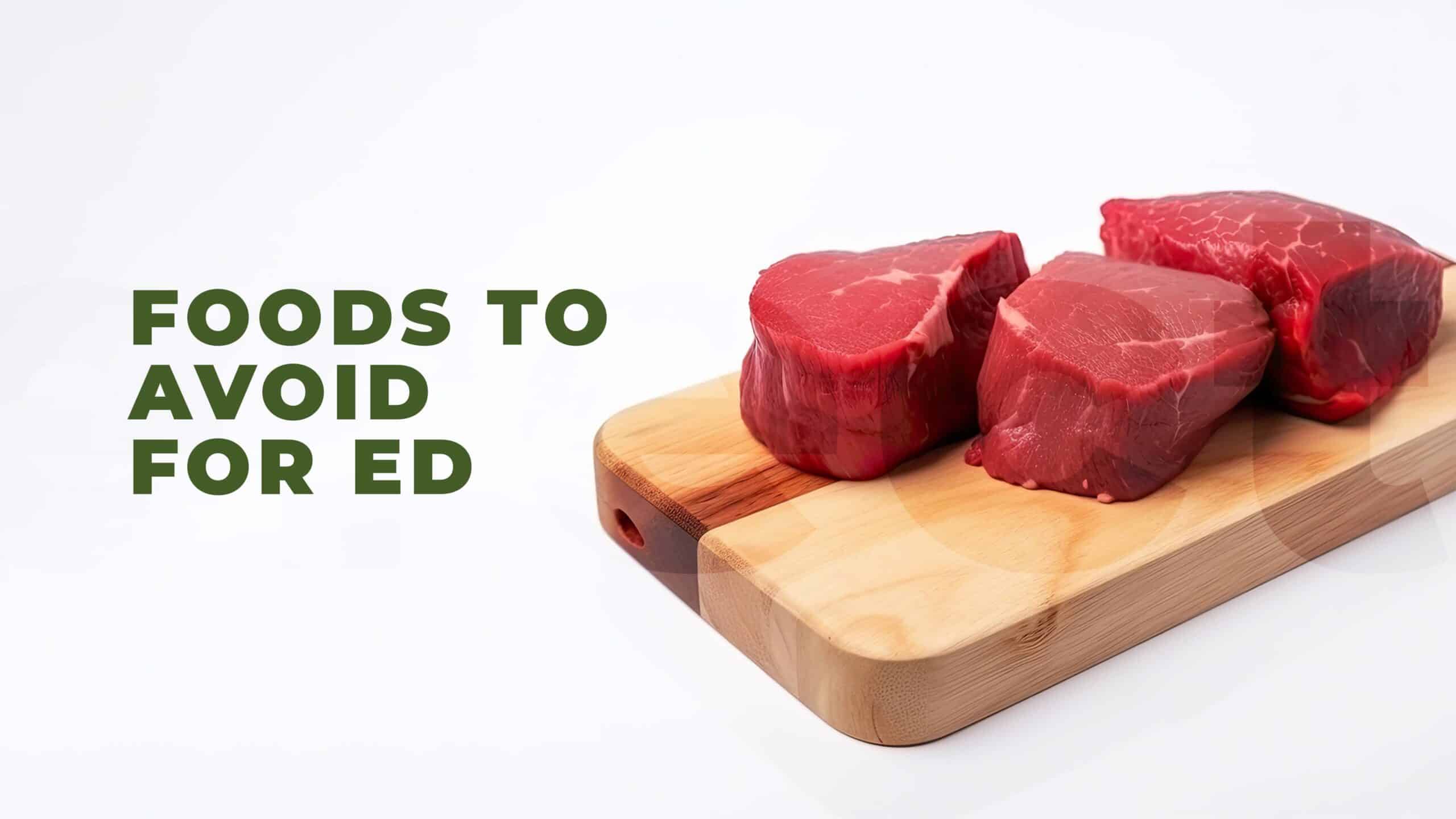
1. Sugar
Excessive sugar intake can negatively impact sexual health. High sugar intake is linked to weight gain and obesity. Both of these are significant risk factors for erectile dysfunction (ED). Sugar can indirectly affect sexual performance by contributing to these conditions.
2. Red Meat
Red meat is high in saturated fat. It contributes to increased cholesterol levels and can clog arteries, including those supplying blood to the penis. This can hinder blood flow, which is essential to achieve and maintain an erection.
3. Salty Foods
Excessive sodium intake is linked to high blood pressure. It is a known risk factor for erectile dysfunction. Many processed foods are high in sodium, making it challenging to control intake.
4. Alcohol
Alcohol consumption can also interfere with erectile function. Excessive drinking damages blood vessels and nerves. This impairs the body’s ability to achieve and maintain an erection. Alcohol can also interact with ED medications, reducing their effectiveness.
5. Soy
Soy-based products are generally considered healthy. However, some studies have raised concerns about their potential impact on sexual health. One case report linked excessive soy consumption to erectile dysfunction (ED)
.Another study found that soy protein powder may decrease testosterone levels. Given that testosterone plays a crucial role in sexual function, this could contribute to ED.
Treatments For ED

When your ED cannot be improved by diet, there’s no need to settle for less-than-satisfying sexual experiences. There are various treatment options that can be used in combination with dietary changes or on their own.
1. ED Medication
Medication is often the most effective treatment for erectile dysfunction (ED). Common oral options include
- Cenforce (sildenafil),
- Cialis (tadalafil),
- Vilitra (vardenafil), and
- Avana (avanafil).
These medications work by increasing blood flow to the penis.
2. Lifestyle Changes
Lifestyle changes too can complement medical treatments:
- Maintain a healthy weight: Obesity is closely linked to ED.
- Regular exercise: Improves blood circulation and health.
- Quit smoking: Smoking is a significant risk factor for ED.
- Manage stress: Reduces health issues that can impact sexual function.
For personalized advice, consult with a healthcare provider. They can recommend the best treatment options based on your specific needs and medical history.
Final Thoughts
Eating the right foods can help with ED. The foods mentioned in the above list are all good choices. Pair a healthy diet with exercise, stress management, and good sleep. Always talk to a healthcare professional for a full treatment plan. This can improve your sexual health and overall well-being.
References
- ‘All natural’ alternatives for erectile dysfunction: A risky proposition. (2015).
- U.S. Department of Health and Human Services. (2021, March 26). Office of dietary supplements – zinc. NIH Office of Dietary Supplements. https://ods.od.nih.gov/factsheets/Zinc-HealthProfessional/.
- Lado-Abeal, et al. (2014, October). Diagnosing and managing low serum testosterone. Proceedings (Baylor University. Medical Center). https://www.ncbi.nlm.nih.gov/pmc/articles/PMC4255853/.
- Cassidy, et al. (2016, January). Dietary flavonoid intake and incidence of erectile dysfunction. The American journal of clinical nutrition. https://www.ncbi.nlm.nih.gov/pmc/articles/PMC4733263/.
- Naz A, et al. (2014). Watermelon lycopene and allied health claims.https://www.ncbi.nlm.nih.gov/pmc/articles/PMC4464475
- Gao J-X, et al. (2012). Lycopene ameliorates erectile dysfunction in streptozotocin-induced diabetic rats.https://pubmed.ncbi.nlm.nih.gov/22530309
- Shirai M, et al. (2018). Oral L-citrulline and transresveratrol supplementation improves erectile function in men with phosphodiesterase 5 inhibitors: A randomized, double-blind, placebo-controlled crossover pilot study. DOI:https://dx.doi.org/10.1016%2Fj.esxm.2018.07.001
- Aldemir M, et al. (2011). Pistachio diet improves erectile function parameters and serum lipid profiles in patients with erectile dysfunction. DOI:https://doi.org/10.1038/ijir.2010.33
- Salas-Huetos A, et al. (2019). Effect of Nut Consumption on Erectile and Sexual Function in Healthy Males: A Secondary Outcome Analysis of the FERTINUTS Randomized Controlled Trial. Nutrients, 11(6):1372. https://doi.org/10.3390/nu11061372
- Canfield, et al. (2015, April 28). Role of caffeine intake on erectile dysfunction in Us MEN: Results from Nhanes 2001-2004. PloS one. https://www.ncbi.nlm.nih.gov/pmc/articles/PMC4412629/.
- Maleki, et al. (2020, January 9). The nitrate content of fresh and cooked vegetables and their health-related risks. PloS one. https://www.ncbi.nlm.nih.gov/pmc/articles/PMC6952105/.
- Jovanovski E, et al. (2015). Effect of Spinach, a High Dietary Nitrate Source, on Arterial Stiffness and Related Hemodynamic Measures: A Randomized, Controlled Trial in Healthy Adults. Clin Nutr Res, 4(3):160-167. https://doi.org/10.7762/cnr.2015.4.3.160
- Karabakan M, et al. (2016). Association between serum folic acid level and erectile dysfunction. https://pubmed.ncbi.nlm.nih.gov/26302884
- Bègue L, et al. (2015). Some like it hot: testosterone predicts laboratory eating behavior of spicy food. Physiol Behav, 139:375-377. https://doi.org/10.1016/j.physbeh.2014.11.061.
- Di Francesco, S., & Tenaglia, R. L. (2017, June 30). Mediterranean diet and erectile dysfunction: A current perspective. Central European journal of urology. https://www.ncbi.nlm.nih.gov/pmc/articles/PMC5510347/.
- Shim, S. H., et al. (2016). Effects of omega-3 fatty acids on erectile dysfunction in a rat model of atherosclerosis-induced chronic pelvic ischemia. https://www.ncbi.nlm.nih.gov/pmc/articles/PMC4810342
- Colpi, et al. (2017, February 8). Levels of l‐arginine and l‐citrulline in patients with erectile dysfunction of different etiology. Wiley Online Library. https://onlinelibrary.wiley.com/doi/full/10.1111/andr.12293.
- Stanislavov, R., & Nikolova, V. (2003). Treatment of erectile dysfunction with pycnogenol and l-arginine. Journal of sex & marital therapy. https://pubmed.ncbi.nlm.nih.gov/12851125/.
- Bahloul, et al. (2003). Sperm oxidative stress and the effect of an oral vitamin e and selenium supplement on semen quality in infertile men. Archives of andrology. https://pubmed.ncbi.nlm.nih.gov/12623744/.
- Wang, L., Tao, L., Hao, L., Stanley, T. H., Huang, K. H., Lambert, J. D., & Kris-Etherton, P. M. (2020). A Moderate-Fat Diet with One Avocado per Day Increases Plasma Antioxidants and Decreases the Oxidation of Small, Dense LDL in Adults with Overweight and Obesity: A Randomized Controlled Trial. The Journal of nutrition, 150(2), 276–284. https://doi.org/10.1093/jn/nxz231
- Forest C, et al. (2007). Efficacy and safety of pomegranate juice on improvement of erectile dysfunction in male patients with mild to moderate erectile dysfunction: A randomized, placebo-controlled, double-blind, crossover study. Int J Impot Res, 19:564-567. https://doi.org/10.1038/sj.ijir.3901570.
- Nishimatsu H, et al. (2014). Improvement of symptoms of aging in males by a preparation LEOPIN ROYAL containing aged garlic extract and other five of natural medicines – comparison with traditional herbal medicines (Kampo). The Aging Male, 17(2):112-116. https://doi.org/10.3109/13685538.2013.771328
- Sugars and obesity https://www.actiononsugar.org/sugar-and-health/sugar-and-obesity
- Heart disease and diet. https://medlineplus.gov/ency/article/002436.htm
- American Heart Association. Shaking the habit to lower higher blood pressure.https://www.heart.org/en/health-topics/high-blood-pressure/changes-you-can-make-to-manage-high-blood-pressure/shaking-the-salt-habit-to-lower-high-blood-pressure
- Arackal BS, et al. (2007). Prevalence of sexual dysfunction in male subjects with alcohol dependence. Indian J Psychiatry, 49(2):109-112. https://doi.org/10.4103/0019-5545.33257
- Siepmann T, et al. (2011). Hypogonadism and erectile dysfunction associated with soy product consumption. Nutrition, 27:859-862. https://doi.org/10.1016/j.nut.2010.10.018
- Goodin S, et al. (2007). Clinical and biological activity of soy protein powder supplementation in healthy male volunteers. Cancer Epidemiol Biomarkers Prev, 16(4):829-833. https://doi.org/10.1158/1055-9965.EPI-06-0882
- Bogdański, et al. (n.d.). obesity–significant risk factor for erectile dysfunction in men. Polski merkuriusz lekarski : organ Polskiego Towarzystwa Lekarskiego. https://pubmed.ncbi.nlm.nih.gov/24720114/.
- Kovac, et al. (2015, December). Effects of cigarette smoking on erectile dysfunction. Andrologia. https://www.ncbi.nlm.nih.gov/pmc/articles/PMC4485976/.





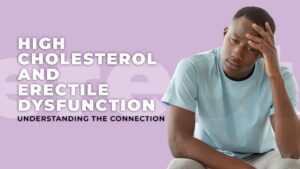
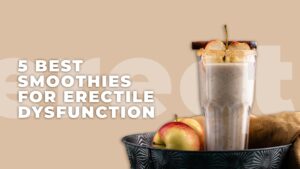

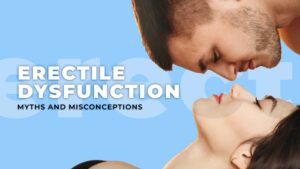
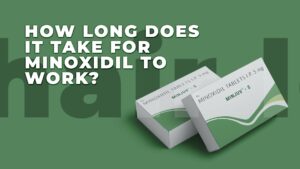


2 comments on “15 Best Foods For ED”
Temp Mail Plus
Your blog is a true gem in the world of online content. I’m continually impressed by the depth of your research and the clarity of your writing. Thank you for sharing your wisdom with us.
Phil Kofford
I conceive this web site has some real superb info for everyone : D.